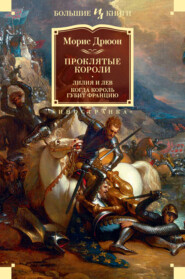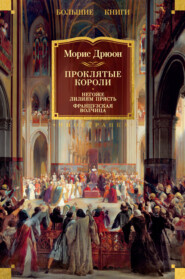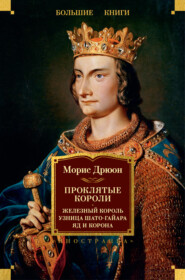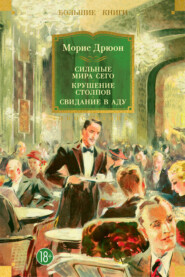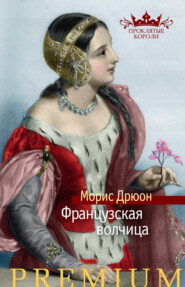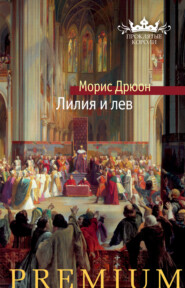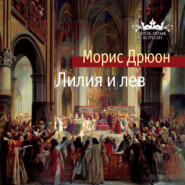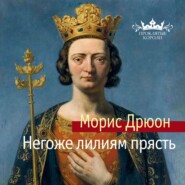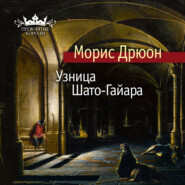По всем вопросам обращайтесь на: info@litportal.ru
(©) 2003-2025.
✖
The Accursed Kings Series Books 1-3: The Iron King, The Strangled Queen, The Poisoned Crown
Автор
Год написания книги
2018
Настройки чтения
Размер шрифта
Высота строк
Поля
The Keeper of the Seals and the Coadjutor exchanged a glance.
‘Louis, your counsel,’ said the King.
Louis of Navarre gave a start, and took a moment to reply, in the first place because he had not the remotest idea what to say and in the second because he was sucking a sweet made of honey and it had stuck in his teeth.
‘Supposing we handed over the Templars to the Pope,’ he said at last.
‘Be quiet, Louis,’ said the King, shrugging his shoulders.
And Marigny raised his eyebrows in commiseration.
To send the Grand Master back to the jurisdiction of the Pope was to begin again at the beginning, to put everything in question once more, the whole basis and form of procedure, to give up the legal powers extracted with such difficulty from the Councils, to annul the whole effort of seven years and open the way once again to every ruse of the defence.
‘And to think that this idiot is going to succeed me,’ thought Philip the Fair, looking at his son. ‘One can only hope that he will mature between now and then.’
A March shower rustled against the leaded windows.
‘Bouville?’ said the King.
Hugues de Bouville thought that the King was asking him his opinion. No one could have had greater devotion than the Grand Chamberlain, or greater obedience, fidelity, and desire to please, but he had no mental initiative. As always, he wondered what Philip the Fair wished to hear.
‘I’m thinking, Sire, I’m thinking,’ he replied.
‘Send for candles, one can’t see,’ said the King. ‘Nogaret, what are your views?’
‘That those who have fallen into heresy should suffer the punishment for heresy, and without delay,’ replied the Keeper of the Seals.
‘What about the populace?’ asked Philip the Fair, turning to Marigny.
‘Their excitement will subside as soon as those who are its cause no longer exist,’ said the Coadjutor.
Charles of Valois made a last effort.
‘Brother,’ he said, ‘you must take into consideration the fact that the Grand Master ranked as a sovereign prince. To put him to death is contrary to the principle by which crowned heads are protected …’
The King’s glance cut him short.
For a short while there was an oppressive silence, then Philip the Fair said, ‘Jacques de Molay and Geoffroy de Charnay will be burned to death tonight on the Island of Jews
opposite the Palace. Their rebellion was public; their punishment shall be public. I have spoken.’
He got up and everyone present followed his example.
‘You will make out the order, Messire de Presles. I wish you all to be present at the execution, Messires, and that our son Charles should be present also. You will inform him, my son,’ he said, looking at Louis of Navarre.
Then he called, ‘Lombard!’
He went out with his hound at his heels.
At this Council, in which two kings, an emperor and a viceroy had taken part, two men had been condemned to death. But not for an instant had anyone felt that they were dealing with two human lives; it was a matter of politics.
‘Nephew,’ said Charles of Valois to Louis le Hutin, ‘we have been present today at the demise of Chivalry.’
7 (#ulink_7a993774-0d7f-5827-8110-876adab70b1e)
The Tower of Love (#ulink_7a993774-0d7f-5827-8110-876adab70b1e)
NIGHT HAD FALLEN. Upon the gentle breeze were borne the odours of wet earth, mud and springing sap. Black clouds were flowing across a starless sky.
A boat, putting off from the river bank by the Tower of the Louvre, drifted across the Seine, whose waters gleamed like the oily surface of an old breastplate.
There were two passengers seated in the boat’s stern, their faces hidden by the high collars of their cloaks.
‘Funny weather today,’ said the ferryman, bending slowly to his oars. ‘In the morning you wake up to such a mist that you can’t see two fathoms distance. And then about ten o’clock out comes the sun. One says to oneself “Here’s spring on the way”. And no sooner said than hailstorms set in for the afternoon. And now the wind’s getting up, and there’s going to be quite a blow, that’s certain. Funny weather.’
‘Get a move on,’ said one of the passengers.
‘I’m doing the best I can. Getting old, that’s what it is. I’ll be fifty-three at the feast of Saint Michael. I’m no longer as strong as you are, young sirs,’ said the ferryman.
He was dressed in rags and seemed to take pleasure in his own querulous speech.
‘You really want to go to the Tower of Nesle?’ he asked. ‘Is there anywhere to land there?’
‘Of course,’ replied the same passenger.
‘We don’t go there much, you know. It’s little frequented.’
Some little distance away, on the left, the lights of the Island of Jews twinkled, and, still farther off, shone the lighted windows of the palace. Over there many boats were going to and fro.
‘Well, gentlemen, aren’t you going to watch the Templars grilled?’ went on the ferryman. ‘I’m told that the King is going to be there with his sons. Is that true?’
‘So it seems,’ said the passenger.
‘And will the Princesses be there too?’
‘I don’t know. I expect so,’ said the passenger, turning his head away to indicate that he had no wish to pursue the conversation.
Then he said in a low voice to his companion, between his teeth, ‘I don’t like this fellow, he talks too much.’
The other passenger carelessly shrugged his shoulders. Then, after a silence, he whispered, ‘Who let you know?’
‘It was through Jeanne, as always,’ the first replied.
‘Dear Countess Jeanne, how much we owe her!’
With every stroke of the oars, the Tower of Nesle drew nearer, a high black silhouette against the dark sky.
The taller of the passengers, he who had spoken second, placed a hand on his companion’s arm.






